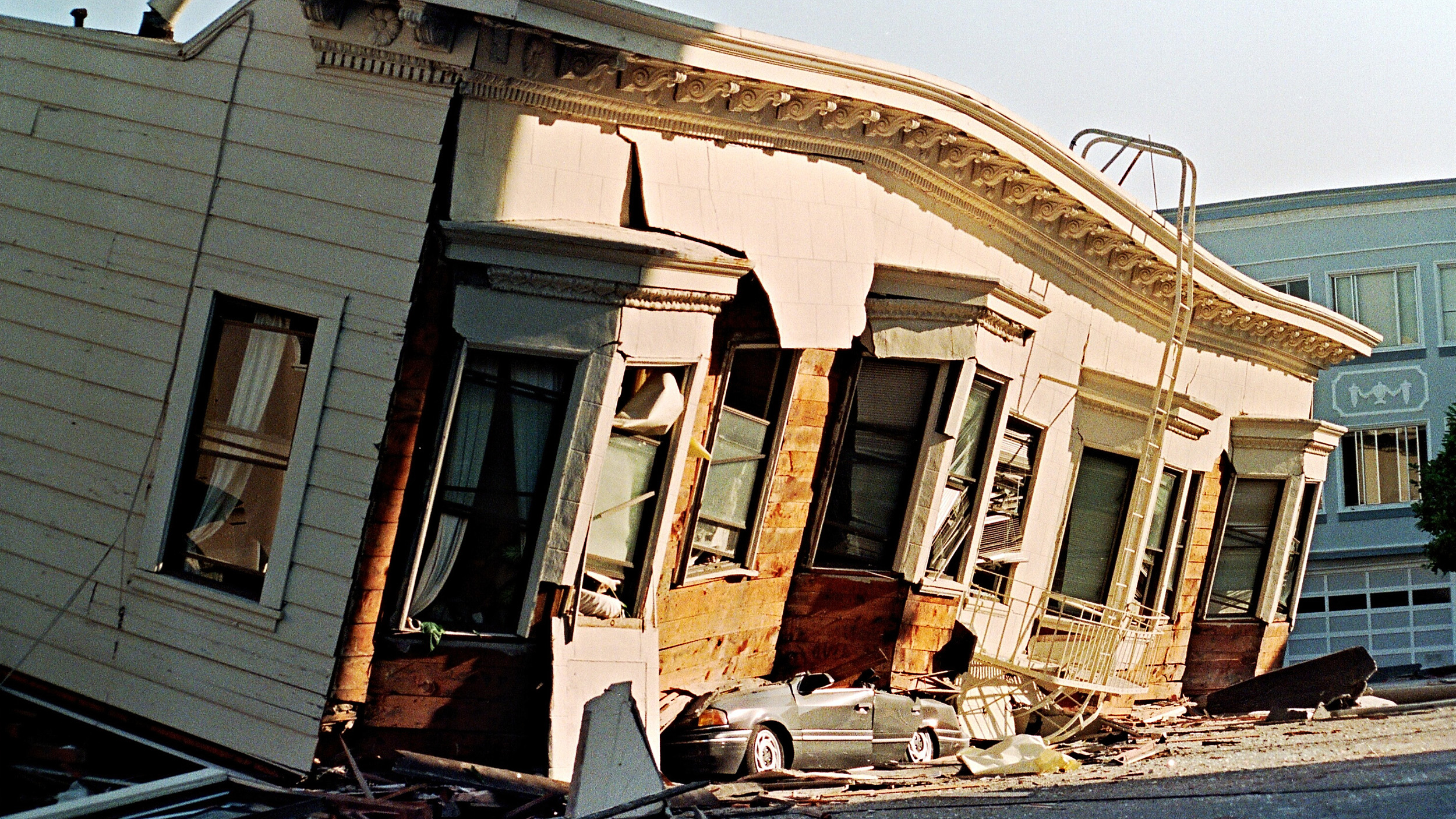Love Doesn't Have to be a Disaster
Originally published in the Chesterfield Observer, February 2009
It's time again for the annual Valentine's Day column. Like most stories about love, this year's Valentine's Day column begins with a tale of natural catastrophe and massive destruction.

It may not be obvious from my picture, but I've lived long enough to have survived the San Francisco earthquake at the age of 27. No, not the 1906 San Francisco earthquake, you smart aleck. I'm talking about the 1989 World Series earthquake. I went to school in San Francisco and happened to be there when "The Pretty Big One" hit on Oct. 17, 1989.
It was a sunny, fall afternoon, the San Francisco Giants and the Oakland A's were just taking the field at Candlestick Park for game three, and like most guys in their 20s, I was settling in to type a college paper for my girlfriend (who somehow had never learned how to type) (or drive, somehow) (but at least she had the initiative to pursue another degree in her mid-20s) (although now that I think of it, all this talk about a former girlfriend is probably not contributing to a positive Valentine's Day this year) (OK, back to the earthquake story).
So there I was, not watching the World Series at 5:03 p.m. I had just finished a long stretch of typing when, remembering what my high school computer science teacher always told me ("Mr. Hansen, please stop drawing pictures of Evel Knievel jumping cars and pay attention…"), I hit "save" on the big, square Commodore 64 computer - this was before many people had picked that first Apple from the tree in the Silicon Valley of Eden. Deep in the innards of the machine a couple of prehistoric hamsters started running on a granite wheel, waking the mini-pterodactyl and prompting him to use his beak to chip the contents of the screen onto a stone computer disk.
A couple seconds later, the 7.1-magnitude earthquake hit. It felt like God had picked up the building and was shaking it like a Yahtzee cup. As my chair was tossed sideways, and I spilled to the floor, I saw the computer monitor crash down off the table and bounce across the room like a die. "Thank God I saved!" I immediately yelled, according to the story I tell my kids (which isn't entirely true) to convince them to save their homework (which they ignore).
However, this isn't a story about frequently saving your work on your computer (although you ought to, because YOU NEVER KNOW WHEN AN EARTHQUAKE WILL HIT). You and my editor are probably wondering what this story is about. I'll tell you in a minute.
Anyway, the biggest California earthquake since 1952 hit, but thankfully I had been in the Golden State for a couple of years, so I was well versed on the correct actions to take during a temblor (a fun word): Do not run from the building since debris may be falling in the street; get under a solid structure like a thick table or desk; stay away from breakable stuff like windows, china cabinets, etc.
And here's what I did: I jumped to my feet and staggered across the heaving floor past a solid wooden table to the window, which I threw open and looked out (knowing full well I was three stories above the street - not sure what the plan was there), then ran around in circles for a few seconds (it was a long earthquake), then dashed from the apartment, down the undulating staircase (another fun word… undulating, not staircase) and out into the street, where cars were swerving out of control, and power lines were falling.
In short, in spite of all I'd learned, I did everything I was supposed to NOT do, and nothing that I was supposed TO do. My rational brain had ducked under some solid structure in my head, and my instinctive, irrational brain had taken over. About the only idiotic thing I did not do was put a big glass vase on my head and juggle knives on my way down the stairs. I was very lucky I wasn't hurt - lots of people weren't so lucky.
There are two Valentine's lessons here for me. The first is obvious: When an earthquake hits (geological or emotional), I've learned not to react instinctively and make the situation worse (for example, by jumping out a third floor window or to irrational conclusions). Usually the best reaction to a significant upheaval is to slow down, think through my next steps and try not to lose my head. It can be counter-intuitive, but when the yelling starts, that's a good time to stop yelling. My wife, Stacy, is very good at that - the more upset I get, the calmer she gets, and in response, the calmer I get.
The second lesson is more about cause than effect. The earthquake was the result of slippage along thrust faults formed by compressive stresses where two continental plates collide. In relationship terminology: Issues that had gone unaddressed for too long finally caused a convulsive, destructive argument. Sometimes when I see those stresses building between Stacy and me, I wonder whether we couldn't release the pressure a little at a time - maybe in somewhat less emotional discussions - so that when the breaking point is reached, it causes less damage. The challenge is that this requires us to regularly raise issues (in rational tones) as they come up, and that is uncomfortable. However, the alternative is to stay silent, defer the discomfort and add the issue to a growing list of frustrations that inevitably will spark a "Pretty Big One."
Neither path is easy, but you have to take one or the other. On that fall evening in 1989, some friends and I drove around the city, and the damage was almost inconceivable. Buildings were burning everywhere, bridges were collapsed and sirens wailed. Late that night, I looked down across San Francisco from Twin Peaks and saw the entire city dark, except for the raging fires.
I know which approach we'd take geologically, if we could. Why not take that approach emotionally since we can?
------------------------------
Chuck Hansen’s books are available at Amazon.com: Nose-Sucker Thingees, Weeds Whacking Back & Cats in the Bathtub (a collection of humor essays) and Build Your Castles in the Air: Thoreau’s Inspiring Advice for Success in Business (and Life) in the 21st Century
